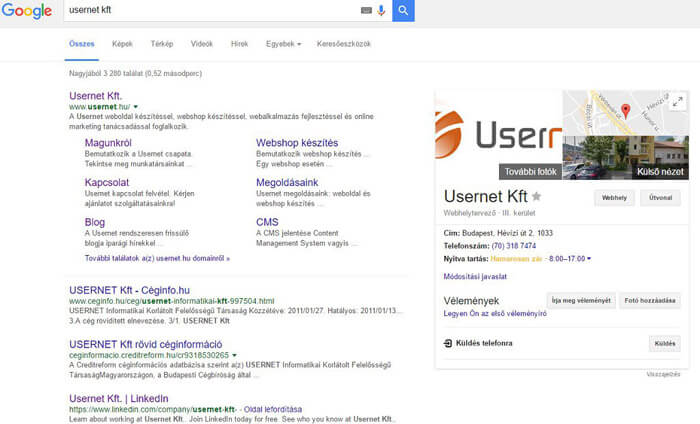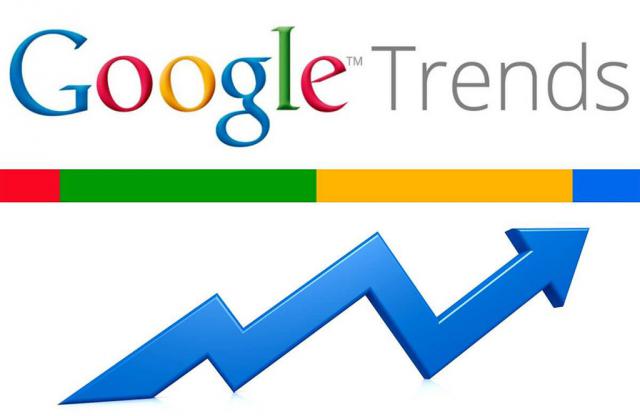What is SEO?
SEO includes all those techniques and strategies that increase the probability of a website's appearance among the organic, i.e. natural, results of Internet search engines, striving for the highest possible ranking.
Search engines comb the entire Internet every day and remember and index every single piece of content. When a user starts a search in Google's system, for example, the company's algorithm creates a list of websites that it considers useful for the search.
The search engine's algorithm decides how to rank websites. What you can do as a website owner is to continuously create content relevant to your target group and to call on a specialist to help you get to the highest possible places in the search results list.
We cover the following main topics below:
Tartalomjegyzék
SEO consists of 3 basic parts:
-
On-Page (content) SEO
-
Technical SEO
-
Off-Page SEO, i.e. how many people refer to you outside of your page
1. Content (On-Page) SEO
Content SEO includes all tasks that take place within the website and can influence your position on the search engine results list, and is not of a technical nature.
Without claiming to be exhaustive, the most important factors are:
-
keywords
-
the place of keywords in the text
-
website design
-
page title
-
website URL
-
headings (headings: H1, H2)
-
title of images (image title), alt text
-
the content (paragraphs, paragraphs, text)
Your website should display content that is useful to your visitors. Gone are the days when you could get ahead in Google rankings by using keywords as often as possible. Context has become extremely important for the algorithms of Google and other search engines.
2. Technical SEO
Technical SEO primarily means that we help search engines to crawl pages as easily as possible. A website must be built in such a way that search engines can immediately recognize each element.
Without claiming to be exhaustive, the most important factors are:
-
website structure
-
user experience (UX)
-
page speed
-
optimization of images
-
the structure of internal links
-
Meta Tags
3. Off-Page SEO
It includes everything that doesn't happen on your website. Link building is an important part, but nowadays it is not the number of links, but their quality that is decisive. All external links must come from a recognized website and relevant content.
Without claiming to be exhaustive, the most important factors are:
-
Social media
-
Guest blogging
-
Interviews
-
Mentions
Google ranking criteria
We will never get an official answer to the question posed in the title. Google publishes the ranking criteria it uses, but by definition it never reveals their weight and the exact relationships between them. The main reason for this is that it is the most closely guarded secret of the search giant.
Furthermore, we will not know the exact weight of the factors, since their stated goal is to write content for people and not for the search algorithm. Quality and relevant content will automatically rise to the top of the search results page. Despite this, based on our experience gained over many years, as well as relying on the experiences of other search engine optimization professionals, a fairly accurate list of factors can be compiled.
Factors of domain(name).
Domain name age
It is one of the many factors, but today it is perhaps one of the least important factors.
Keyword in the domain name
This is also a less important factor, but it doesn't hurt if a keyword important to you is included in your web address. For example, your company name.
The TLD (top level domain) is the same as the country
TLDs are the parts after the dot in your website address, for example ".de" or ".hu". For example, if you search for something in Hungary, domain names ending in ".hu" will be higher in the results list.
Subpage level factors
Keyword in URL
Take, for example, if the name of your subpage is: http://www.usernet.hu/hirek/hogyan-novelhetem-az-aktivast-facebook-oldalamon-13-tipp-az-aktivabb-es-elkotelezettebb-kovetokert/391, then the Google knows what that subpage is about.
Keyword in title
The sooner a keyword appears, the better. Keywords at the beginning of the title are worth more than at the end.
Keywords in the content
When you write a post or article, you try to optimize it for several keywords, as this helps search algorithms find your page. It is very important that you always write content for the users and not for the Google algorithm.
Page loading speed
The faster your page loads, the greater your advantage in the search engine. We have previously written about this topic in detail, you can access it here.
Pictures
If your content contains images and/or videos, Google will rank it higher, as you provide your visitors with a better user experience than your competitors.
Grammar and spelling
Content published with poor spelling is not very trust-inspiring, and it is also unpleasant. Google's algorithm is already advanced enough to filter out most spelling mistakes and rank websites that do not provide an adequate experience to their users. We also published an article on this topic, it is worth reading.
Listings in the table of contents
Use lists in your published content. According to Google, this helps readability, so it increases the user experience (UX) of your website.
Amount of secondary keywords
As long as the content has several keywords that are loosely related to each other, Google evaluates it very positively. It means that the content is written to a very high standard.
Full website level ranking factors
Contact menu
If you have it, then according to Google's interpretation, you are available at any time, that is, you are reliable.
Page structure
Use categories and give clear titles to your posts. If your visitors can easily use your site, you are user-friendly and the algorithm will rank you higher.
Fresh content
Publish regularly on your website and update your existing articles at regular intervals.
Mobile friendly website
It is linked to ranking through user experience. If your website is displayed perfectly on all mobile devices, i.e. it is responsive, you will have an advantage in the ranking in the case of searches from mobile devices, and this will also have the same effect on searches launched from desktop computers. In Google's algorithm, it is now certain that this is the most important ranking factor!
SSL certificate
Google has acknowledged that it has become a ranking factor if the site has a security certificate. "https" pages are ranked higher.
Imprint and Terms of Use
These two pages serve as proof to Google that a functioning business or real person is behind the page, therefore these pages are the basis of reliability.
Visitor behavior
Low bounce rate
It indicates a quality site if you have a lot of visitors staying on your site, as your content and website grabs the attention of your visitors.
Number of pages viewed
If your visitors look at an average of 4-5 subpages, it is a very good sign, because your site provides them with interesting and useful information.
Returning visitors
If a website is interesting, you will visit it again. Google also thinks similarly on this topic.
Click-throughs from the Google search page
Google aims to provide users of its services with the best answers to their searches. If many people reach your website from Google's search results page, Google interprets it as having done a good job, and will therefore continue to recommend you primarily for that search in the future. That is, it will rank higher in your search results.
Social media
If there is a high level of activity related to your page on social media, be it on any social media, Google evaluates that your content is of high quality and therefore ranks it higher on the search results page. The opposite is true if you are inactive on social media.
Why is SEO important?
A higher position - on the search and results page - means more visitors to your website. If you want to achieve higher traffic on your website, but you don't want to pay for separate ads; then strengthening search engine optimization (SEO) is the solution.
The first 3 places on the search and results page receive an average of 60% of the clicks; no better argument is needed to strengthen search engine optimization (SEO).
Search engine results are targeted and personalized: After a user performs a search in, for example, Google's system, the algorithm displays the most relevant results for the user, taking into account countless factors.
Compared to traffic from social media, organic results convert better in most cases because these users are looking for answers to some of their questions/problems.

In addition to increasing website traffic, the use of SEO provides the following benefits:
Reliability and recognition: users trust search engines because they know that they will always display the most relevant results for their searches. It follows that the higher the position of a website on the search and results page, the more reliable users consider it to be.
Moreover, trust not only means more conversions, but also increases the awareness of the website and the brand/business, thereby facilitating marketing activities on other online channels.
In addition, SEO also helps in creating a better user experience (UX), since search algorithms are not only about keywords, but also about the experience and usability of browsing your website.
If your website meets the needs of the users, it will also rank high on the search and results pages.
How long does it take to get ahead in Google?
Most of the time, this is the question that prospective clients ask me when we start talking about the SEO of their website. It is understandable that every business wants to see results in SEO as soon as possible, which in this case means improving rankings and getting into the top 10.
The exact amount of time it takes to get ahead in Google is influenced by several aspects, but it can generally be said that even with the help of intensive search engine optimization, it takes at least 3-6 months to achieve good results.
SEO trends in 2020
Search engine algorithms are getting smarter every day. Users are using Google to perform more and more searches, and the number of voice-based searches is also constantly increasing. For this reason, the question may arise in every website owner: How does all this affect my SEO strategy so far?
1. Structured data is becoming increasingly important
With the development of search algorithms, Google obtains data from more and more sources. Nowadays, Google is already able to create its own content meta description from the content on a website. If Google displays structured data for a result, about 30% more people will click on that page. Therefore, our website must contain data that Google can display as structured data on the search and results page. What do we mean?
- Customer reviews
- Opening Hours
- Prices
- Event data
2. User experience (User experience - UX)

In 2020, we no longer optimize our website for the search algorithms themselves, but for the search engines and our visitors. For this reason, providing an excellent user experience has become a priority. Basic factors for providing an excellent user experience (UX):
3. Page loading speed
Nowadays, the loading speed of websites has become a critical factor. If a website doesn't load fast enough (3 seconds), users simply won't open it.
4. Technically flawless website
Users want to see and use every element of the website, so it must be technically flawless and up-to-date. This is the area that is almost exclusively the responsibility of the web developer, it depends on whether the website performs properly in this area.
5. Mobile optimization
More than half of Internet users now browse from a mobile device. It is a basic requirement that your website is displayed well on all devices! The key to this is responsiveness.
6. The content is still (very) counts
Although Google's algorithm is becoming more and more advanced, the textual content of web pages is still its primary source. In recent years, the analysis of text content has undergone tremendous progress, so all your content must be unique in order for your website to appear on Google's search and results page. This development will continue in 2019, so your goal should still be to publish the best content on a given topic and the most useful for users on your website.

7. Further expansion of voice-based searches
Voice search has begun to change the way users search for information in recent years. It can be an attractive alternative to manually typing the text you are looking for. The voice recognition systems of Google, Apple and Amazon are becoming more and more advanced and sophisticated, so its impact on marketing cannot be ignored in the near future. It seems very likely that in 2019, the volume of voice-based searches will cross a critical mass and therefore will not be ignored.
How can you turn it to your advantage?
- Update the business information on your website to make sure it appears in map searches
- Create a "Frequently Asked Questions" subpage. This helps you appear in the results when a user asks a specific question
- Regularly audit your website with an external expert who can point out deficiencies that have escaped your attention.
8. Google Mobile First Index
In recent years, Google has constantly emphasized that the focus is increasingly on mobile devices, instead of desktops. Many still do not take this seriously. Until now, websites have typically used the desktop version of the content of the given page for indexing, which may have caused problems for mobile search engines, as this version may differ significantly from the mobile version. Mobile first indexing means that from now on the mobile version of the page is used for this. In other words, anyone who has not yet optimized their website for mobile should definitely do so in 2019, because it is almost certain that the lack of it will adversely affect them!
9. Links are still important
Almost every year you can read that "link building is dead" or "links no longer have any practical use". In fact, links still play an important role in search engine optimization in 2019. However, the implementation methods have changed radically, it is really worthless if two websites exchange links.
Nowadays, so-called linkless backlinks have become the most important. This means that someone mentions your website or an article on their website or in social media, but there is no direct access to your website. Google's algorithm evaluates this as if you are an expert on the given topic, since a user independent of you argued with the help of your content.
10. Stronger focus on image searches
Last year, Google changed its image search algorithm. Users no longer need to navigate to that page if they want to view an image in its original size. This resulted in a decrease in traffic for many websites, as Google displays the images of each website in a small image gallery and therefore it is not necessary to visit the given website.
We can use this change to our advantage by harmonizing the images, infographics and other multimedia content on our website, making them more harmonious and increasing their quality. As a result, users will encounter a high-quality image gallery and are more likely to visit your website.
SEO techniques that you must avoid in 2020!
There are some search engine optimization techniques that a few years ago had a positive effect on the site's position on the search and results page, but nowadays they are no longer effective, and in some cases can even adversely affect our ranking.
1. Keyword stacking
Google's algorithm no longer considers the density of a specific keyword, i.e. how many times the desired keyword appears on a page. It is not the quantity, but the quality that determines how relevant a web page is to the search term of the users.
2. Writing for search algorithms
Search algorithms are already advanced enough to understand redundant keywords, their variations and synonyms. This technique no longer works in 2019 either. Write useful content for users.
3. Buying links
Years ago, it was still a working technique for website owners to buy a large amount of links that pointed to their website, but nowadays this is not only a waste of money, but Google also ranks such websites lower on its search and results page.
4. Low quality content
Years ago, even a poorly written content could get you ahead in the results. However, this has now ceased. Duplicated, short, keyword-stuffed and unauthentic content. Because of these, Google not only ranks you lower, but in many cases it doesn't even show your page in its results! Always publish unique and useful content on your website!
Summary
Today, no business can be successful in the online world without properly following SEO trends and practices. Better Google rankings increase organic traffic, website traffic and the company's income from online sales. Good search rankings help improve the user experience and increase customer trust along with it. In addition, good rankings reduce the amount spent on paid advertising by producing higher Page Quality Scores, which lowers Ads costs.




